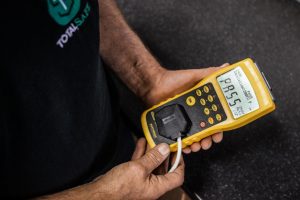Even though we have been inundated with rain for what seems like forever, summer is just around the corner. We all know British summertime is unpredictable, but there are occasions where our offices or working environments are not equipped to deal with a sudden heat wave. The electrical appliances and items within our working environment, if not used correctly, can put us at risk.
The portable desk fans and portable air-conditioning units are brought out in a desperate attempt to keep us cool where built-in units are not available or not in use. But, just remember; many fires are caused by electrical appliances with defects and can be very dangerous if standard checks are not in place.
Here are some top tips to keep your electrical appliances safe….
- Never cover the air vents on portable devices as this could cause overheating which poses a HUGE risk of fire
- Do not overload electrical sockets, extension leads of adapters. Always check the current rating of an electrical adapter or extension lead before you plug it in. Overloading sockets carries a high risk of overheating and the potential to burst into flames
- Check the condition of your wires regularly. Always be on the look out for signs of fraying, general wear and tear or loose plugs.
Most importantly, you should ensure that all items have been PAT tested. 
This is where we can help….
Your Total Safe engineer will perform a visual inspection of all appliances. They will then carry out a more in-depth check using specialist PAT testing equipment. Once tested and deemed safe, a PASS sticker will be applied to all items. This sticker will display the date that the last test was conducted as well as the date the next test is due by.
We keep a record of each and every test and due date for all our clients. we make sure we arrange re-tests before your certification elapses so, with Total Safe, you’ll never have to worry about your appliances again. We make sure they are always tested and compliant and, most importantly, safe.
Contact the Total Safe team today to find out more.
You can find out more about PAT testing regulations from the Health & Safety Executive.
